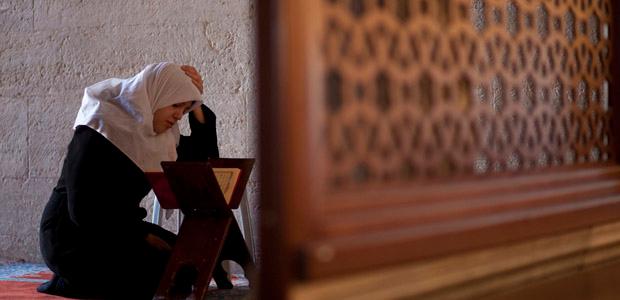Women in Turkey: Out of the Home and Into the Mosque
Istanbul, Turkey– At the Suleymaniye mosque in Istanbul, the women’s sections are at the back of the enormous open prayer area but divided by wooden screens. Vice-deputy Kadriye Avci Erdemli, a woman, has spearheaded a project aimed at improving the women’s prayer experience at nearly 3,000 mosques within the city. PHOTO BY JODI HILTON
The project is called “Beautifying the Mosques of Istanbul for Women” and it’s trying to change how Turkish women pray. Kadriye Avci Erdemli is the Deputy Mufti of Istanbul and one of Turkey’s highest ranking female religious officials. She organized the study of 3100 mosques and was apalled by what she found.
“I was really upset,” said Erdemli. “Women are being excluded from religious practice, which is in itself un-Islamic. According to global surveys, women are more religious than men. But despite this, in many mosques, the facilities for women were either in bad condition or there was not enough space.”
While the investigators found that women weren’ intentionally excluded from mosques, neglect was widespread. Now Turkey is prosperous, and more importantly, with the Islamic AK Party in power, there exists the political will to fix the problem.
At the 16th Century Kilic Ali Pasa mosque, Imam Selman Okumus admits his mosque was part of the problem. “My mosque was like this. Some cables and different things were in the women section,” Okumus says.
In many mosques, the prayer area set aside for women is tiny, moldy and ugly. But Okumus is proud of the improvements made at his mosque. He shows me the new women’s bathroom, shiny and modern.
“They need slippers because they have to wash their feet,” he says.
Mosques have faucets so worshippers can ritually wash their feet before praying, but they’re only for men. Because women are uncomfortable washing in public and the facilities at mosques are often poor, they generally wash at home. Or they might decide its too much bother and just pray at home.
“They don’t want to show their bodies when they want to take ablution,” Okumus says.
So the mosque got a new machine which might make the difference for women: an electric foot-drier. It looks just like a hand drier, except that its placed near the floor at an angle comfortable to dry your feet.
And Okumus says changes like this appear to be working. Outside, worshipper Zeynep Gunay says public expressions of religion have become more socially acceptable in Turkey since the Islamic AK Party took power ten years ago. And Gunay says she feels the increase of female energy in mosques as well.
“It all started with special prayer times for women,” says Gunay. “And in the past, it used to be only old women who prayed. Now I notice that the average age of women in the mosques has gone down.”
Just a few years ago, she says, women could be forced out of the mosque during crowded prayer times, such as Friday afternoon, when the overflow of men would be channeled into the women’s section.
No one is suggesting that men and women should pray together. The idea is that women should be part of the same whole, separate but not isolated. Vildan Bilisik stopped by for prayers after her nearby marketing course given by an international cruise ship line. She says it’s important for everyone – men and women – to pray in the mosque.
“Praying with the community gives you a special kind of spirituality,” says Bilisik. “When you are praying alone, you might not be able to concentrate so well. Different ideas can pop up.”
Whatever pops up in Turkey’s eternally strained relations between piety and its secular state, analysts say the changes are part of the Islamic governing party’s efforts to extend religion into more spheres of public life.
